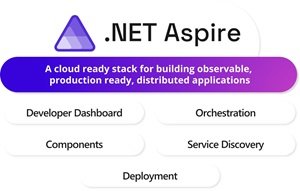News
.NET Aspire Cloud development tools debut in Visual Studio 2022 v17.10
During this week’s Build 2024 developer conference, Microsoft shipped Visual Studio 2022 v17.10, the latest update to its flagship IDE that improves support for Copilot AI and launches the new .NET Aspire cloud development tool.
The AI enhancements are highlighted by a unique GitHub Copilot experience integrated into the extension that combines the original GitHub Copilot “AI pair programmer” and the accompanying GitHub Copilot chat tool, which has made advanced natural language programming possible. This combined, integrated AI feature was introduced in Preview 3 last month (see “Microsoft Unifying Copilot Tools in Visual Studio 2022”).
The new .NET Aspire tool, meanwhile, is described as a cloud-ready stack for building cloud-native applications with .NET. It was introduced in the first preview release of .NET 9 earlier this year (see “First preview release of .NET 9 highlights cloud-native development and AI applications”), and its features in Visual Studio Code were included in the C# SDK update. earlier this month (see “C# SDK Update Helps Manage NuGet Packages and More in VS Code” ). This last article explained: “Developers can now run .NET Aspire projects from within VS Code with familiar software Ctrl-F5 (Run Without Debugging), which will run the .NET Aspire application, running the main application project and related front-end and API projects.
This week .NET Aspire went GA with Visual Studio 2022 v17.10.
“NET Aspire brings together tools, templates, and NuGet packages that help you more easily build distributed applications in .NET,” Microsoft said in announcing the tool’s general availability yesterday (May 21). “Whether you’re building a new application, adding cloud-native functionality to an existing application, or deploying .NET applications to production in the cloud today, .NET Aspire can help you get there faster. »

The Visual Studio 2022 v17.10 release notes provide more information, stating, “Whether you’re building distributed, cloud-native applications using containerized resources like PostgreSQL and Redis, or Azure components like Storage or Service Bus, .NET Aspire will simplify your development experience and give you greater visibility into your distributed applications.
It does this using features such as:
- Run multiple projects and debug without having to configure the solution
- Built-in support for HTTP resiliency, health checks, and OpenTelemetry using a set of extensions and smart defaults
- Convenient in-browser views of logs, metrics, and distributed traces of container resources and .NET projects with the new .NET Aspire Dashboard launch experience
- A new deployment methodology built on the Azure Developer CLI (AZD), so developers have the ability to deploy with multiple nodes in most cases, without having to write their own infrastructure code.

Everything a developer would want to know about .NET Aspire can be found in the .NET Aspire documentation.
Meanwhile, Microsoft focused on the GitHub Copilot feature by announcing the general availability of Visual Studio 2022 v17.10.
“By integrating GitHub Copilot directly into Visual Studio, we’re bringing you a context-enhanced coding partner, providing intelligent suggestions and code completions that help you stay focused and productive,” said Microsoft’s Mark Downie. “We’ve updated familiar features to use the latest AI models with the goal of keeping you in the creative flow for longer. To enable these AI experiences, activate your GitHub Copilot subscription today by logging in to GitHub and starting your free trial. »
Other update highlights in the release notes include:
Troubleshooting and diagnostics
- Breakpoint conditions generated by artificial intelligence: Copilot improves debugging by offering intelligent expressions for conditional breakpoints and tracepoints based on your code, making the setup process fast and efficient.
- Improved .NET Counter Profiler with new metrics: The .NET Counter Profiler in Visual Studio now supports UpDown and ObservableCounter metrics, allowing real-time tracking of incremental and decremental changes, as well as self-management of aggregated totals with customizable callbacks, as well as a flying filter function to dynamically filter data based on keywords.
- Improved GC insight and memory usage analysis tools: The Insights tab in the Managed Memory window now includes GC Insights, providing detailed analysis and timing estimates for induced garbage collection instances, which can hurt application performance by requiring manual intervention instead of automated memory management.
Other improvements
- Cancel the solution loading function: Developers who wish to stop the solution loading process before all projects are loaded can now cancel the operation and return to a blank IDE environment.
- Improved Teams Toolbox and Workload/Template WinUI accessibility: The Teams Toolkit now uses a new project file (.ttkproj) to organize all files for managing the Teams app, and creating a new project will generate a solution with a TeamsApp project for the app manifest and toolbox features, as well as a C# project. with sample code for app features such as a chatbot or tab.
- Tips for embedding C# code in Razor files: Overlay hints can now be enabled in Razor files for C# code to display parameter names and built-in type hints, and this feature can be accessed via Tools > Options > Text Editor > C# > Advanced .
about the author
David Ramel is an editor and writer for Converge360.
